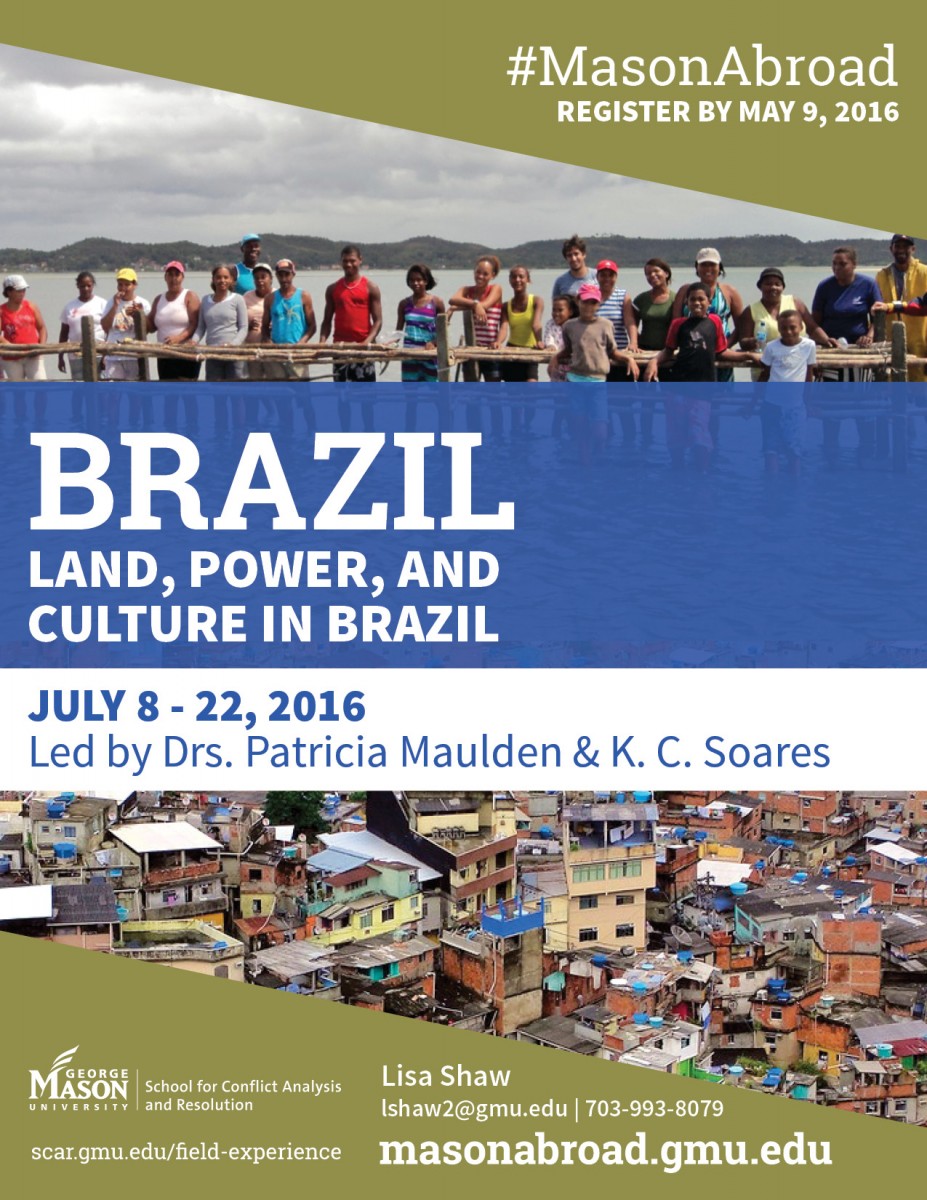
Several countries in the Americas, including Brazil, are grappling with the lingering consequences of colonialism and neocolonialism. The Portuguese discovered Brazil in 1500, establishing the first colonial settlement of Salvador in 1532, which became the capital in 1549. The Portuguese were interested in the natural resources and agricultural potential of Brazil, initially using indigenous peoples as a source of labor. In mid-1600 however they brought slaves from several West African countries including Angola and Nigeria to augment the labor force. The indigenous peoples and slaves worked together on sugar cane plantations and later on other agricultural and extraction enterprises. Over time some of the slaves escaped and established their own enclaves, co-existing with the various indigenous populations in the areas.
Today the residents of the communities founded by these escaped slaves reflect both the African and the indigenous cultures and are referred to as quilombo and have overall little interaction with the larger society. To extract the wealth potential of the quilombo land (similar to past colonial land policies) and to satisfy global economic market needs quilombo land is routinely seized by the Brazilian state. These seizures do not benefit local communities and often involve the pressing of local residents into forced labor. As this pattern has continued over time quilombo concerns for the integrity of their historical territory have increased, becoming not only an economic dilemma but one that involves the fabric of their society and culture.
Course Purpose
The purpose of this field experience is to allow students the opportunity to work, interact, and organize workshops in conflict mapping and other conflict resolution approaches at the behest of the local Quilombo communities and with students and faculty from the Federal University of Bahia (EUFBA). Prior to student engagement in such activities, the GMU faculty team will conduct trainings and workshops with GMU students to build capacity, confidence, and awareness of their own positionality in a context not their own. The student cohort will serve as a community of practice, each member bringing their own knowledge and skill set that will allow the community to be effective in a number of situations. Group dynamics will be stressed throughout the course and reflected upon before the trip, during the field study, and after returning home.
Learning Components
Students will engage in Bahia’s culture, learn about Bahia’s history, witness Afro-Brazilian aspect of life in Bahia, and visit historical sites, monuments, and churches. The cultural aspects of the course are vital for the overall learning objectives. Students will attend conflict mapping workshops, converse with local community members, and work with faculty members and students from the Federal University of Bahia (EAUFBA) to gain insights into the effects of historical colonial and current neocolonial practices and their impact on the everyday life and well being of individuals and communities. The importance of economic security and cultural continuation as contentious local issues will underpin much of the field experience focus.
Learning Goals & Objectives
• Learn through participation about the important issues and values of local communities • Develop increased understanding of conflict situations and their effect on civil society
• Engage with an ongoing conflict identified by the EAUFBA partner team
• Generate recommendations to address and begin to resolve the conflict
• Train partner team in facilitation, problem-solving, and mediation skills
• Conduct action research
• Gain skills in group dynamics, working effectively by using team member strengths
Dates of Course: July 8 to July 22, 2016
Pre-Trip Meeting Dates: May (day and time TBD) at the Arlington Campus, Metropolitan Building, Room 5183
Cost of Course: $3,000 Program cost includes 3 credits of coursework (CONF 385 or CONF 397, or CONF 695), lodging, most meals, local transportation, speakers and guides. Airfare, visas and immunizations are not not included.
Instructors: Dr. Patricia Maulden and K.C. Soares
Registration Deadline: May 9, 2016
Deposit Due: May 23, 2016 ($500)
Final Payment: June 3, 2016
Lodging: Lodging will consist of hotel/guest house in Salvador and Cochoeira, (Bahia).
Meals: Some meals will be provided and those not provided will be easily available through locally owned cafes and small restaurants. Both Salvador and Cochoeira have grocery stores for added supplies.
Transportation: Group travel will be organized by the UFBA using bus and van companies. Students traveling on their own time will be instructed to use only licensed taxi services, to look for government registration upon entering the taxi, and leaving immediately if the document is not present.
Zika Virus Warning: All travelers should be aware that the Zika Virus is present in Brazil, and the CDC has issued a Level 2 Warning to Practice Enhanced Precautions. Please visit the CDC Traveler's Health Page for more information.
Patricia A. Mauld en is Associate Professor of Conflict Resolution and Director of the Dialogue and Difference Project with The School for Conflict Analysis and Resolution at George Mason University. She earned her Bachelor of Arts degree in Anthropology from the University of California, Santa Cruz and her Master of Science and Doctor of Philosophy degrees in Conflict Analysis and Resolution from George Mason University. Her research interests include generational and gendered dynamics of conflict and peace, social militarization / demilitarization processes, urbanization, post-conflict peace economies, and peacebuilding practices. She has written about child soldiers generally as well as, more specifically, the roles of girls and women in conflict – whether as soldiers, combatants, or associates of fighting forces. She is currently investigating the dynamics of NGOs as private peacebuilding contractors and their roles in the post-conflict peace economy, the post-conflict paradox – engaging war while creating peace, and exploring peacebuilding over time, more specifically the trajectories of post-conflict knowledge.
en is Associate Professor of Conflict Resolution and Director of the Dialogue and Difference Project with The School for Conflict Analysis and Resolution at George Mason University. She earned her Bachelor of Arts degree in Anthropology from the University of California, Santa Cruz and her Master of Science and Doctor of Philosophy degrees in Conflict Analysis and Resolution from George Mason University. Her research interests include generational and gendered dynamics of conflict and peace, social militarization / demilitarization processes, urbanization, post-conflict peace economies, and peacebuilding practices. She has written about child soldiers generally as well as, more specifically, the roles of girls and women in conflict – whether as soldiers, combatants, or associates of fighting forces. She is currently investigating the dynamics of NGOs as private peacebuilding contractors and their roles in the post-conflict peace economy, the post-conflict paradox – engaging war while creating peace, and exploring peacebuilding over time, more specifically the trajectories of post-conflict knowledge.
 K. C. Soares is a Senior Consultant in management, organization development and institution building, and human capacity building, and executive coaching. She is also a Visiting Professor at the School of Management, Federal University of Bahia, in Brazil, where she is collaborating with them in the areas of innovation and globalization of the School. She worked for over 18 years in the Organization of American States in social and income generating projects and was responsible for the OAS Center for Training and Development. She has worked in Africa, Europe, and the Americas.
K. C. Soares is a Senior Consultant in management, organization development and institution building, and human capacity building, and executive coaching. She is also a Visiting Professor at the School of Management, Federal University of Bahia, in Brazil, where she is collaborating with them in the areas of innovation and globalization of the School. She worked for over 18 years in the Organization of American States in social and income generating projects and was responsible for the OAS Center for Training and Development. She has worked in Africa, Europe, and the Americas.
K. C. serves on several Boards of Directors, in addition to S-CAR Board of Advisors, including – Chair, OAS Federal Credit Union; the Founding President of IODA-International Organization Development Association; The Amani Institute; and, Partnership for Sustainable Peace. She has taught at the School of Management, Federal University of Bahia in Brazil where she currently holds a research grant; Howard University, School of Business, Washington, D.C.; and, Virginia Tech University, School of Business, Northern Virginia campus.
She holds a Ph.D. from Cornell University and speaks Portuguese, Spanish, and English.
Students who have questions about the Brazil 2016 summer course should contact Patricia Maulden, K.C. Soares or Lisa Shaw.
.jpg)
Previous Trips
- Approaches to Conflict Management and Resolution: Field Work with Syrian Refugees in Jordan - Spring 2017
- Brazil - Summer 2016
- Indonesia - Gender and Conflict - Winter 2017
- Indonesia - Research Methods - Summer 2016
- Malta - Bridging Differences: Migration in the Mediterranean Spring 2017
- Northern Ireland - Summer 2016
- Reflective Practice in Israel/Palestine Winter 2017
- Spain: From Victimhood to Social Justice Basque Country Spring 2017
- The Balkans - Summer 2016


